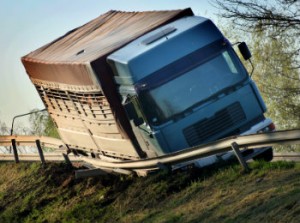When cargo isn’t properly loaded or secured, it can shift unpredictably during transport, making it difficult for the driver to maintain control. A trailer that sways, fishtails, or becomes imbalanced creates serious hazards for everyone on the road.
A Serious Threat on the Road
Improperly loaded cargo can strain the driver’s control and increase the risk of serious accidents.
Common causes of accidents include:
- Excessive weight
- Unbalanced or top-heavy loads
- Unsecured or shifting cargo
- Unequal weight distribution across axles
Any of these issues can result in cargo breaking loose or shifting, making the truck unstable and increasing the risk of rollovers, jackknifes, or multi-vehicle collisions.
Questions? Our knowledgeable staff is available at (877) 284-6600.
Impact of Overweight Loads on Truck Performance
 An overloaded semi-truck doesn’t just break regulations—it endangers everyone on the road. Performance issues may include:
An overloaded semi-truck doesn’t just break regulations—it endangers everyone on the road. Performance issues may include:
- Accelerating down inclines faster than expected
- Difficulty stopping or maneuvering quickly
- Imbalanced handling, especially on curves and turns
Unequal weight distribution is one of the leading causes of jackknife and rollover accidents. Every axle must bear a properly distributed load to maintain safe operation.
Find more information on these topics in the Q&A section below.
- Trucking Industry Regulations: Know the Rules That Keep Our Roads Safe. Regulations are detailed in Title 49 of the Code of Federal Regulations.
- Understanding Truck Weight Limits. Designated weight ratings.
Who is Responsible for these Semi-Truck Accidents?
Trucking companies that own the truck and employ the driver may be held responsible; however, several parties may share responsibility in a trucking accident, including:
- The truck driver
- The owner of the truck or trailer
- The leasing company
- Vehicle or parts manufacturers (in cases of mechanical failure)
- The shipping company or loaders (in cases of improper cargo handling)
At Nash & Franciskato, our attorneys conduct detailed investigations to determine fault. We might examine things such as:
- Who loaded and secured the cargo
- Maintenance and inspection records
- Weight logs and distribution
We pursue maximum compensation from all liable parties to support your recovery.
Have questions? Call our experienced team at (877) 284-6600.
Free Case Evaluation by Trucking Accident Specialists
Collisions involving semi-trucks and other large commercial vehicles are often devastating. To protect your rights, it’s essential to seek counsel from experienced truck accident attorneys.
Based in Kansas City, Nash & Franciskato represents individuals harmed in commercial trucking accidents, including those caused by overloaded or improperly loaded trucks.
Reach out today for a free, no-obligation evaluation of your case.
Start Your Free Case Evaluation Today
Data source: FMCSA Large Truck and Bus Crash Facts
Editor’s Note: This page was originally published on December 20, 2015. It was updated on July 15, 2025, for content and accuracy, and republished at that time.
Photo Credits:
- Sidebar: .shock(Benis Arapovic) Image file – via depositphotos.com
- draskovic(Srdjan Draskovic) Image file – via depositphotos.com
FAQ
Trucking Industry Regulations: Know the Rules That Keep Our Roads Safe
Federal oversight plays a key role in ensuring safety in the trucking industry. Regulations are detailed in Title 49 of the Code of Federal Regulations and are enforced by:
- Federal Motor Carrier Safety Administration (FMCSA)
- U.S. Department of Transportation
- State departments of transportation
These regulations establish standards that trucking companies, owners, and drivers must meet.
Understanding Truck Weight Limits
Trucks carry designated weight ratings—e.g., “G.V.W. 40,000” or “G.V.W. 80,000″—that reflect the combined weight of the vehicle and its cargo. Exceeding the GVWR (Gross Vehicle Weight Rating) is illegal and hazardous. Drivers must routinely stop at weigh stations to ensure compliance.
You will typically see a rating such as “G.W. 40,000” or “G.W. 80,000.” This number refers to the maximum combined amount of freight load and vehicle weight the truck must adhere to.
Improper cargo loading includes:
- Weight unevenly distributed in the trailer or with a high center of gravity
- Overloaded trailers
- Cargo that is improperly braced or blocked
- Cargo secured with too few tie-downs or with tie-downs that are not rated for the weight of the cargo
- Lack of edge protection when the cargo could cut tie-downs
- Cargo that does not have header boards to prevent spilling during stops or accidents
FMCSA Cargo Securement Laws
To prevent accidents caused by shifting loads, the FMCSA mandates specific securement practices:
- Securement systems must meet performance criteria and be free of damage or wear
- Tiedowns (e.g., webbing, steel straps) must withstand accelerations and decelerations in all directions
- Cargo must be held firmly by dunnage, bags, tiedowns, or shoring bars
Drivers and loaders must inspect every aspect of the securement system before hitting the road. You can learn more in the FMCSA Driver’s Handbook on Cargo Securement and Cargo Securement Rules.
